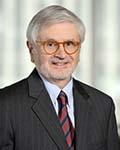That Princeton "improperly and systematically diverted to its own use and benefit more than $100 million from the Robertson Foundation and has fraudulently concealed its wrongdoing."
- That the university engaged in "flagrant disregard of donor intent."

- That Princeton "has acted unilaterally and covertly for decades to subvert the Robertsons' intent."

- That Princeton long ago began "a pattern and practice of taking Foundation funds for improper purposes and then concealing these misappropriations from the family trustees."
To all of this, Princeton has responded stiffly: The family's charges are "unsubstantiated and misleading." The university has "worked assiduously to safeguard and expand the assets of the Robertson Foundation and to serve the purposes for which the Foundation was established." Princeton will not argue the issues in the press.
Has Princeton subverted the intent of the donors? Maybe no; quite possibly, yes. More than 40 years have passed. It's a different world.
On one point of fact, the Robertson heirs surely have a valid complaint: Very few of the graduates who benefit from the Robertson bequest have wound up in government service specifically devoted to the field of foreign affairs. Princeton responds that "the field of foreign affairs" has expanded dramatically over the past 50 years. The university's famous Woodrow Wilson School of Public and International Affairs prepares graduates not only for positions in government but also for work in a vast array of nongovernmental positions that advance the donors' original intention.
In their suit, the heirs complain that Princeton "has secretly spent and continues to spend Foundation funds improperly" in support of 14 corollary programs that benefit graduates only indirectly. The list includes centers for worldwide research in such areas as child welfare, population changes, international law and environmental policies. Surely such support is at least tangentially relevant to Charles Robertson's original concept. The heirs' objection strikes me as captious.
My guess is that Princeton's current problem with the Robertsons' 1961 bequest is largely of its own tactless making. Under tax law, the legacy had to be administered by a board numerically controlled by the university. In the beginning, three family trustees agreeably socialized with the university's four nominees. For another 20 years after Charles Robertson's death in April 1981, unanimity continued to reign at the annual meetings.
Over these four decades, the university's trustees understandably came to view the Robertsons' Foundation as their own little piggy bank, to be shaken and spent as they damn well pleased. When the majority trustees dissolved the board's own investment committee three years ago in favor of the university's own investment service, it is no wonder that the heirs felt snubbed. A little bit of sugar might have made the medicine go down.
The chancery division of the state Superior Court has denied Princeton's motion to dismiss the Robertsons' suit. Unless the family's hurt feelings can be sufficiently assuaged, the case will go to trial. Appellate proceedings could delay a resolution for several years. The heirs have publicly promised that if they win, they will give the whole $600 million to other beneficiaries and keep nothing for themselves. Hopeful supplicants should prepare themselves for a long, long wait.
(Letters to Mr. Kilpatrick should be sent by e-mail to kilpatjj@aol.com.)
COPYRIGHT 2005 UNIVERSAL PRESS SYNDICATE
This feature may not be reproduced or distributed electronically, in print or otherwise without the written permission of uclick and Universal Press Syndicate.



